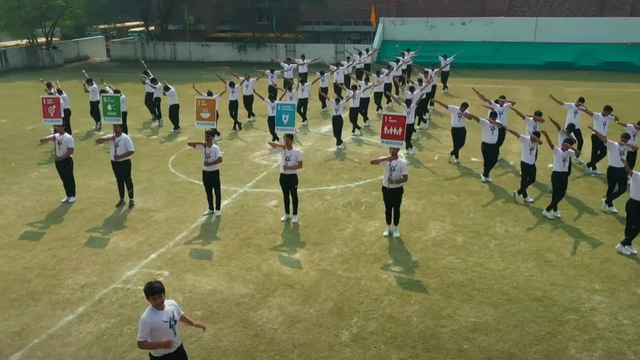Global Schools Hosts Side Event Exploring Sustainable Development Pedagogy and Curriculum at ECOSOC Partnership Forum
At the 2024 ECOSOC Partnership Forum, the Global Schools Program (GSP) hosted a virtual side event entitled “Best Practices in Education for Sustainable Development Pedagogy and Curriculum.”
This event showcased the stories of educators who have excelled in integrating Education for Sustainable Development (ESD) into their curriculum, and culminated in the launch of a guidebook, Practicing Education for Sustainable Development: Case Study Guide for Educators, Volume 2 , which offers practical insights for educators hoping to incorporate ESD into their classrooms and communities.
The event featured GSP Advocates Serafin Cristobal, Handrich Hernando, Geoffrey Holt, Stephanie Arias Catalán, Lydia Chinoye Chilaka, Pankaj Rathore, and Oluwasegun Ogunsakin, who shared their first hand experiences and demonstrated the pivotal role of education in developing a sustainable future.
Stephanie presented first, and highlighted the effectiveness of project-based learning in ESD. Focusing on SDG 14, her students created comics that illustrated the impact of human activities on water sources and eventually took a trip to a local beach to engage in a cleanup. This hands-on project fostered a deeper understanding of SDGs and encouraged students and families to actively work towards a cleaner environment.
Lydia also touched on the importance of engaging students with the SDGs. She introduced the SDGs through an interactive game that had her students paint a mural for the school featuring each of the SDG graphics. Despite financial constraints, Lydia utilized available resources and encouraged students to repurpose materials previously considered “wasteful.”
While Oluwasegun now works as a project manager, he shared valuable insights from his time as an educator. He stressed the importance of applying local context, thus ensuring student buy-in. Tasks and activities catered to student backgrounds and resources are more beneficial for students.
Rafi Cristobal touched on his experience as the Director of the Social Impact and Sustainability Program at the Harbor School in Hong Kong. Experiential learning at the Black Dolphin (a local ship in the harbor), The Foundry (a makerspace), and a Marine Science Center enriches students' understanding of ocean literacy. The diversity of experiential learning opportunities caters to all students making them excited about the SDGs and proficient in applying aspects of sustainability to their everyday lives.
Advocating for a holistic integration of SDGs into various subjects, Vice Principal Pankaj Rathore incorporates SDGs school-wide, using morning assemblies and mandated integration of SDGs into all subjects. Emphasizing SDGs in arts creates memorable learning experiences, and involving families fosters a community dedicated to sustainable development. The holistic integration of SDGs enhances student awareness and community commitment.
In an Australian school with a low socioeconomic index, Geoffrey Holt shared his experiences in addressing local environmental challenges. His students collaborated with experts to build animal sanctuaries and prevent dieback spread. This approach not only fostered increased environmental appreciation but also raised awareness of indigenous cultural perspectives. Geoff emphasized that leveraging local challenges enhanced student involvement in Education for Sustainable Development (ESD), promoting teamwork and community engagement.
These insights, shared during the side event, provide a preview of the approaches to integrating ESD into educational settings and communities that are included in the Case Study Guide. Global Schools is grateful to the featured educators and is hopeful that this guide will inspire educators to integrate ESD into their schools and communities.
